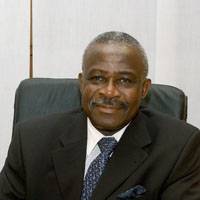Japan should take the lead in developing an agenda for the international community for giving aid to Africa when the country hosts the Group of Eight summit next year and the fourth Tokyo International Conference on African Development, according to the vice president of the U.N. International Fund for Agricultural Development.
Kanayo F. Nwanze, who was here for talks with the Japanese government, said the IFAD's mission is to reduce rural poverty, since over 70 percent of the world's poor are concentrated in the rural areas.
IFAD was established in 1977 to eradicate rural poverty in developing countries. Nigerian Nwanze, an expert on agricultural development, was appointed its vice president in March.
"We seek to improve the livelihood of women and improve the nutrition standard of children," Nwanze said. "We also try to provide education for them and upgrade social welfare as a whole. To achieve these goals, we work together with government ministries as well as nongovernmental organizations."
The IFAD official called Japan a leader in providing development assistance to Africa. Between 1993 through 2005, Japan provided more than $10 billion for Africa through bilateral official development assistance. In 2005, Japan pledged to double its assistance to Africa within three years.
Nwanze praised Japan for its support of IFAD's New Rice for Africa (NERICA) initiative to develop a new type of rice. NERICA combines the hardiness of African rice species with certain types of high-yield Asian rice.
"The potential of NERICA is enormous in improving the nutrition and income standards of the African people," he said.
Nwanze said he hoped more young Japanese would go to Africa to help with IFAD programs.
"We very much look forward to Japan's increased support toward IFAD in the form of regular resource provision, special program execution for Africa and cofinancing," he said.


















With your current subscription plan you can comment on stories. However, before writing your first comment, please create a display name in the Profile section of your subscriber account page.